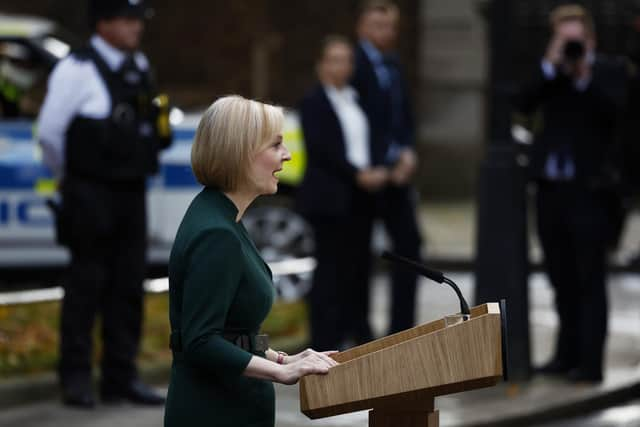Liz Truss to call for retirement age to be raised and fracking to be reintroduced
The former prime minister will use a speech at the Institute for Government think tank on Monday to defend decisions made during her brief spell in Number 10, calling it unfair to say she had pursued unfunded tax cuts.
She will also call for Rishi Sunak’s Conservative Party to embrace free market ideologies, and ditch some green commitments amid cost-of-living pressures on voters.
Advertisement
Hide AdAdvertisement
Hide AdMs Truss was forced out of office last October after the budget of £45 billion of tax cuts outlined by her chancellor Kwasi Kwarteng sparked an economic crisis.


Since then she has continued to defend and build on her brand of conservatism in a bid to find a solution to stagnant growth.
The speech is expected to see Ms Truss reject suggestions that her tax cuts were “unfunded”.
She will point to analysis by the Centre for Economics and Business Research (CEBR) forecaster and consultancy body, while criticising the “static models” used by the Office for Budget Responsibility.
Advertisement
Hide AdAdvertisement
Hide AdThe founder of CEBR, Douglas McWilliams, is a member of her Growth Commission project and offered a more sympathetic analysis of last September’s mini-budget than some other economists.
Pitched as her first significant intervention on the economy since leaving office, Ms Truss will say: “Some people have described these as ‘unfunded tax cuts’. This is not a fair or accurate description.
“Independent calculations by the CEBR suggest that cutting the higher rate of income tax and the ‘tourist tax’ would have increased rather than decreased revenues within five years.
“So quite the opposite of being unfunded, these tax cuts could have increased funding for our public services.”
Advertisement
Hide AdAdvertisement
Hide AdShe will claim Mr Sunak’s Government has spent £35 billion more than she would have as prime minister, arguing that if the policies included in her growth plan had been followed, growth would have eventually been higher.
“Investment would not have faltered in the North Sea, were it not for the windfall tax,” she will say. “We would have got moving on fracking and lower energy bills would now be on the horizon.
“A more competitive rate of corporation tax would have persuaded the likes of AstraZeneca not to relocate elsewhere. There would have been more duty-free shoppers and a boom in the number of self-employed.”
She will repeat her attack on the so-called “anti-growth coalition”, and argue that her plan was not implemented due to a reaction from “the political and economic establishment which fed into the markets”.
She will say: “I was effectively forced into a policy reversal under the threat of a UK meltdown.”
But she will concede that she and Mr Kwarteng were in a “rush” to get “results”.